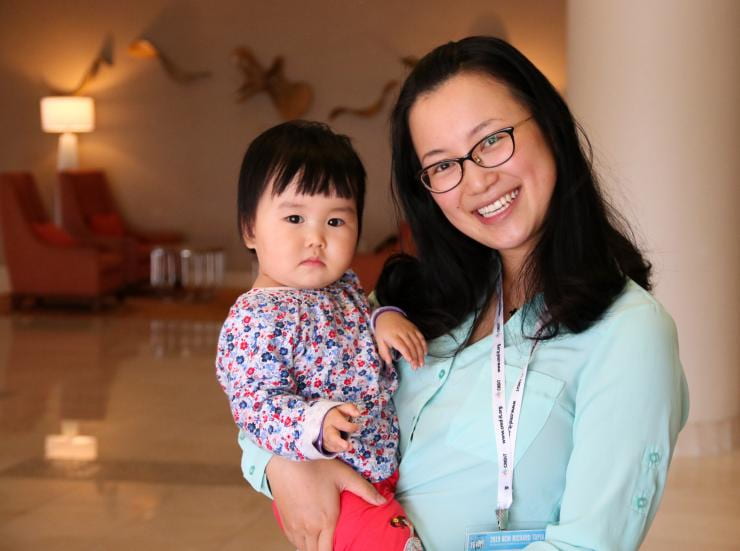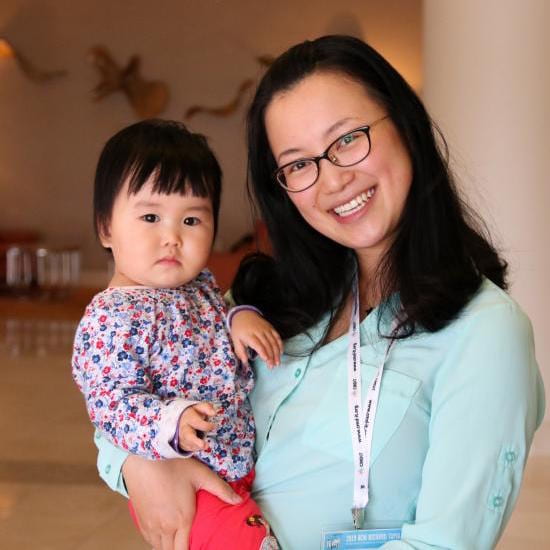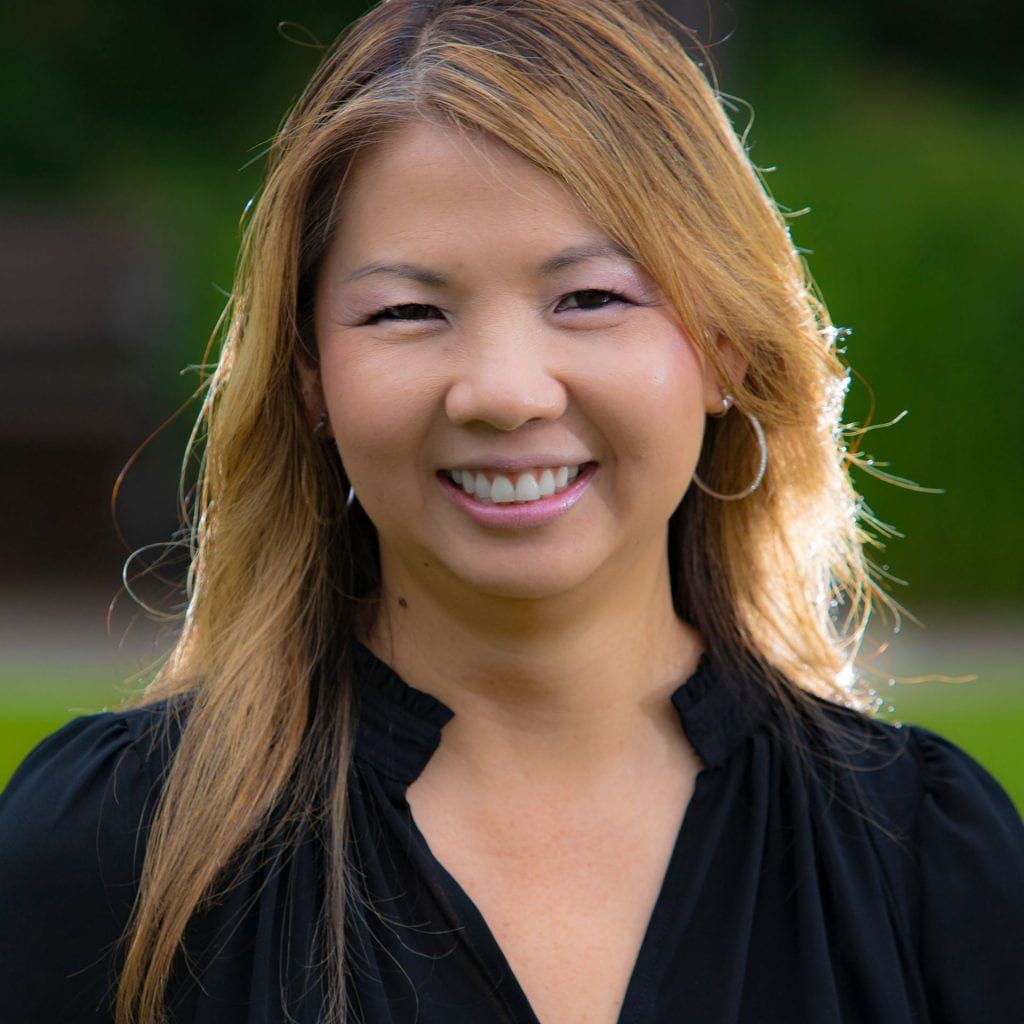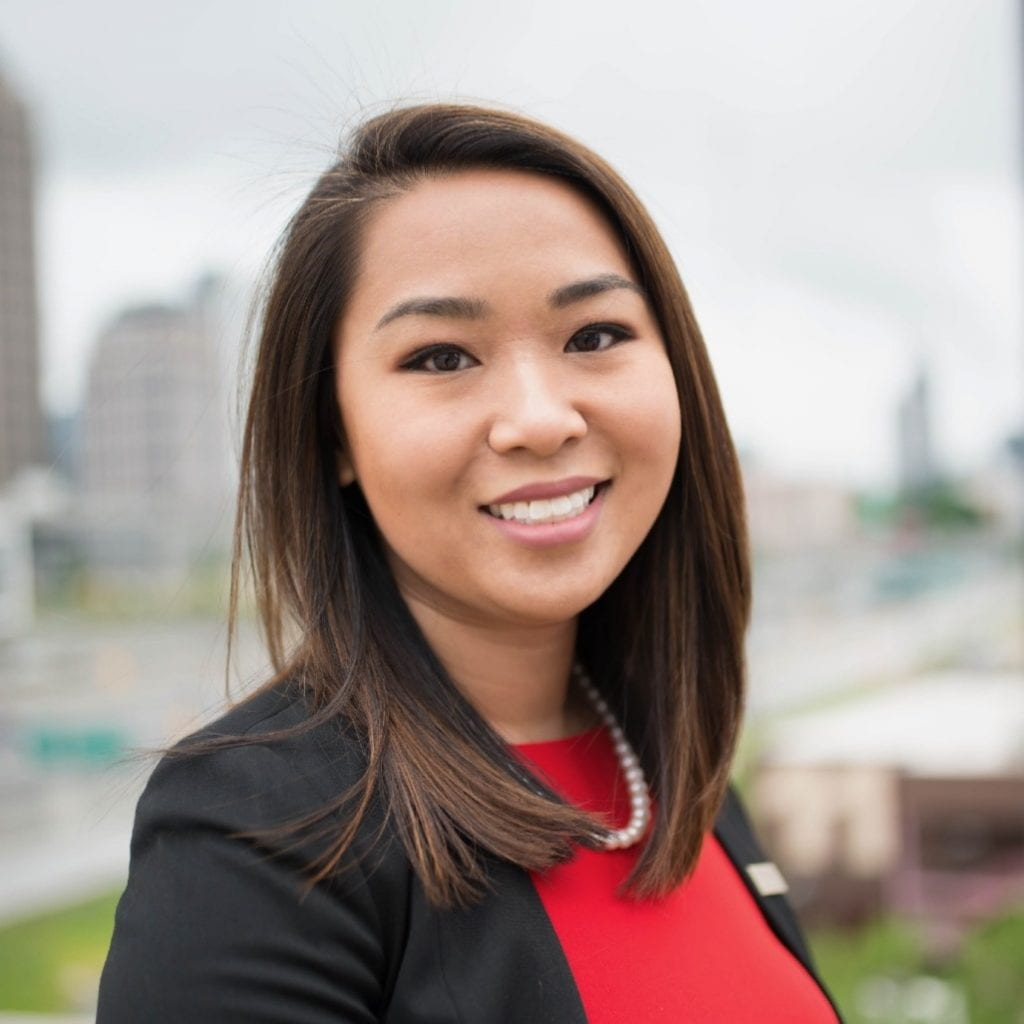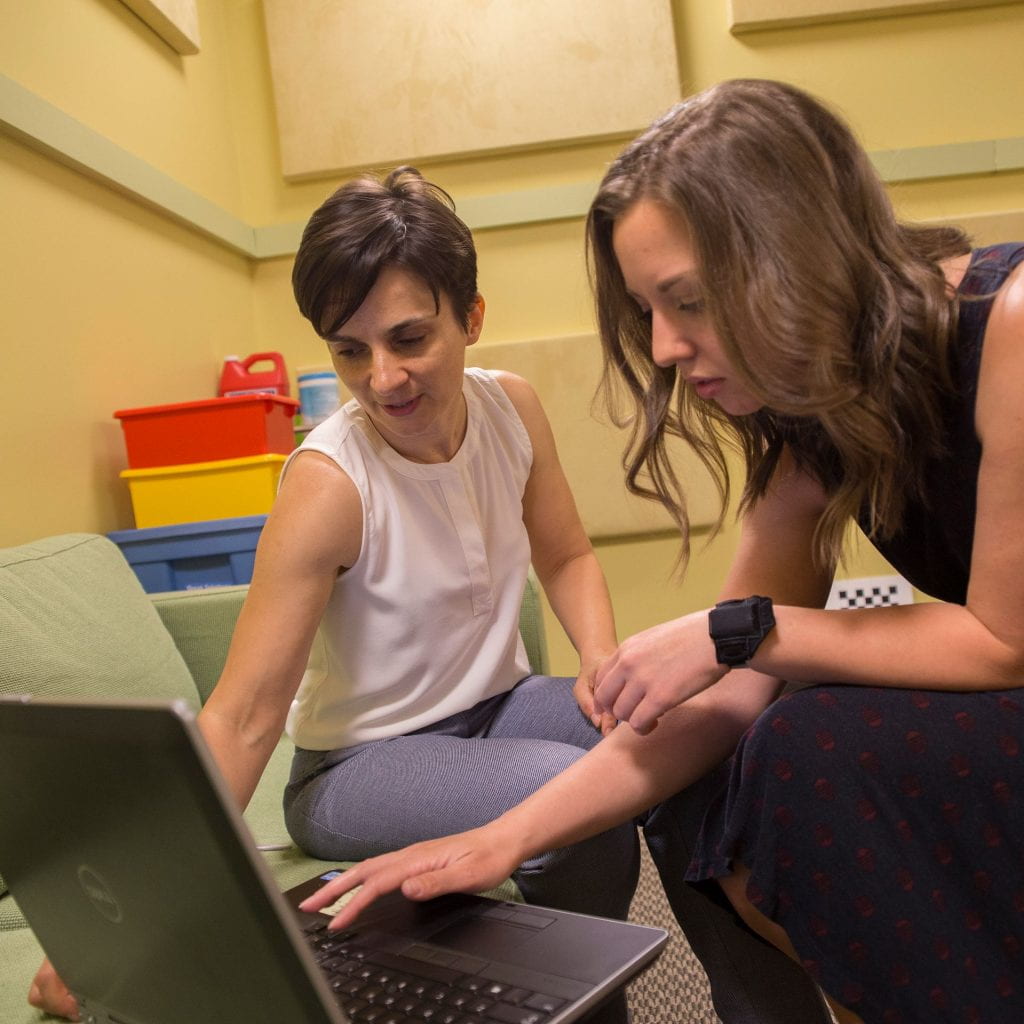Army Officer Blazes Trail in Online Cybersecurity Program
Becky Borrebach has a unique opportunity to be a role model for women, especially those interested in STEM, when she officially finishes the Online Master of Science in Cybersecurity degree program at Georgia Tech in May.
The U.S. Army captain will be among the first women, if not the first, to graduate from the program, which started in 2019.
Borrebach has a penchant for challenging herself – she graduated in 2013 from the U.S. Military Academy at West Point and now operates in two primarily male-dominated professions: the military and cybersecurity.
One similarity between the U.S. Army and Georgia Tech that Borrebach has seen is that both organizations want the best people, regardless of gender.
“If you show up, and you have something to contribute, people want you on the team – that’s been my experience and has allowed me to thrive,” said Borrebach.
Borrebach has had a variety of information technology jobs and postings and is now stationed in Hawaii as an information systems engineer for the 25th Infantry Division. Her next assignment will be helping modernize the U.S. Army’s central human resources infrastructure, located at the Pentagon.
The data analytics course in her graduate program was one of her favorites and she thinks it – along with her focus in the policy track – will position her well to tackle data cleaning and cybersecurity policy issues in her new assignment.
“When I was an undergrad, I always tried to think about how I would apply my education when I started my career. Now, what I learn in grad school I can apply right away on the job, whether it’s as a manager or on the technical side,” Borrebach said.
The Cornwall, New York native is currently in her OMS Cyber capstone course analyzing different cybersecurity frameworks and determining which ones apply best to cloud technology models.
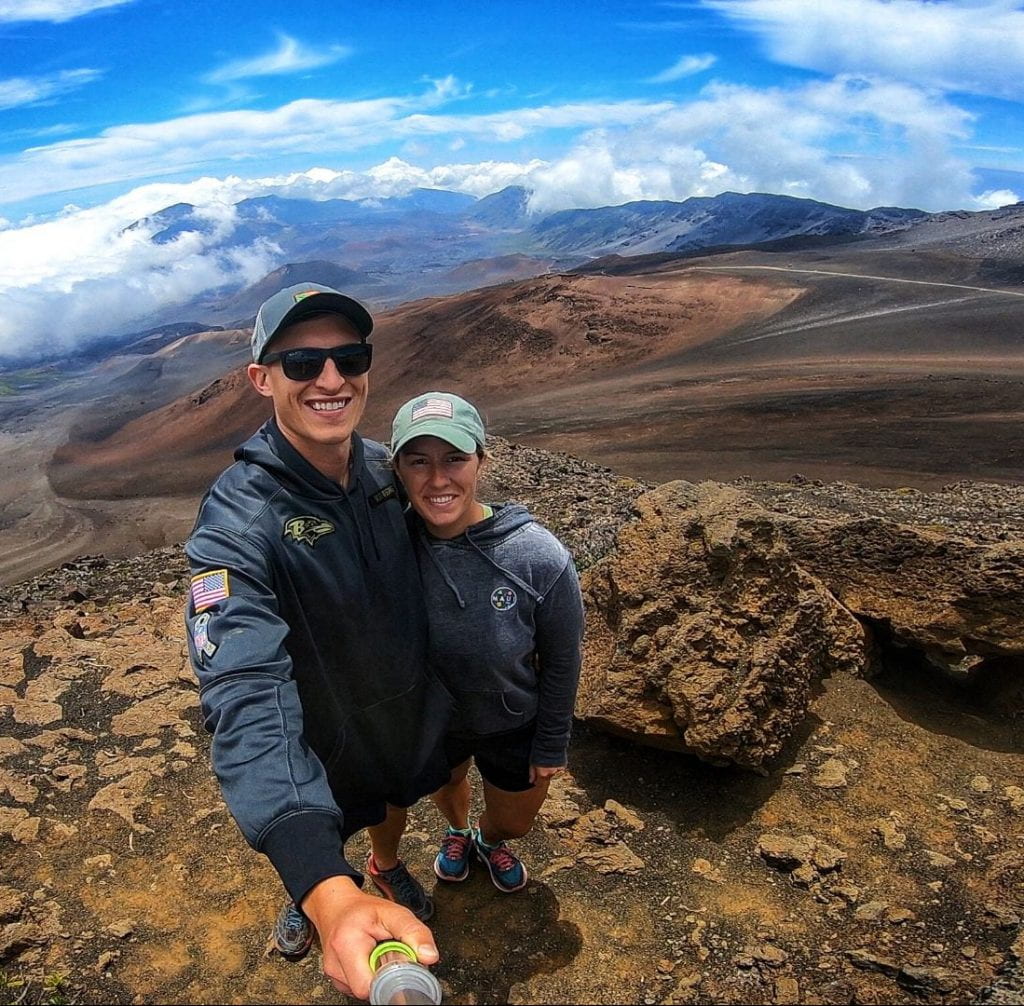
“If you show up, and you have something to contribute, people want you on the team – that’s been my experience and has allowed me to thrive.”
– U.S. Army Capt. Becky Borrebach
(pictured with husband Capt. Drew Borrebach in Hawaii)

“Generally, when you apply anything to a network, you have to put a policy in place and have to come up with standards,” she said.
“Lots of organizations are adopting cloud computing and shifting away from older models where a lot of IT infrastructures were localized. There’s a host of issues that come with this type of change, and one thing I’m looking at is how organizations determine who to trust and what type of agreements they make with third parties to secure their data.”
Borrebach has used the online learning format to make the most of her graduate experience and has been blown away by the level of talent among her classmates and the intellectual discussions within the study forums.
As for being that role model: “Women role models are important in the Army and for STEM too. They can be incredibly influential. If I could be a role model to someone then, wow, I think I’ve made it.”
OMS Cyber is the 3rd and latest online grad program that Georgia Tech offers, and it has enrolled more than 1,000 students to date. Georgia Tech’s new School of Cybersecurity and Privacy, in its first year, is bringing together the institute’s various degree programs in these areas and developing new degrees and training to meet the need for cybersecurity talent.
RELATED: Interactive Visualization of Women of Cybersecurity and Privacy at Georgia Tech
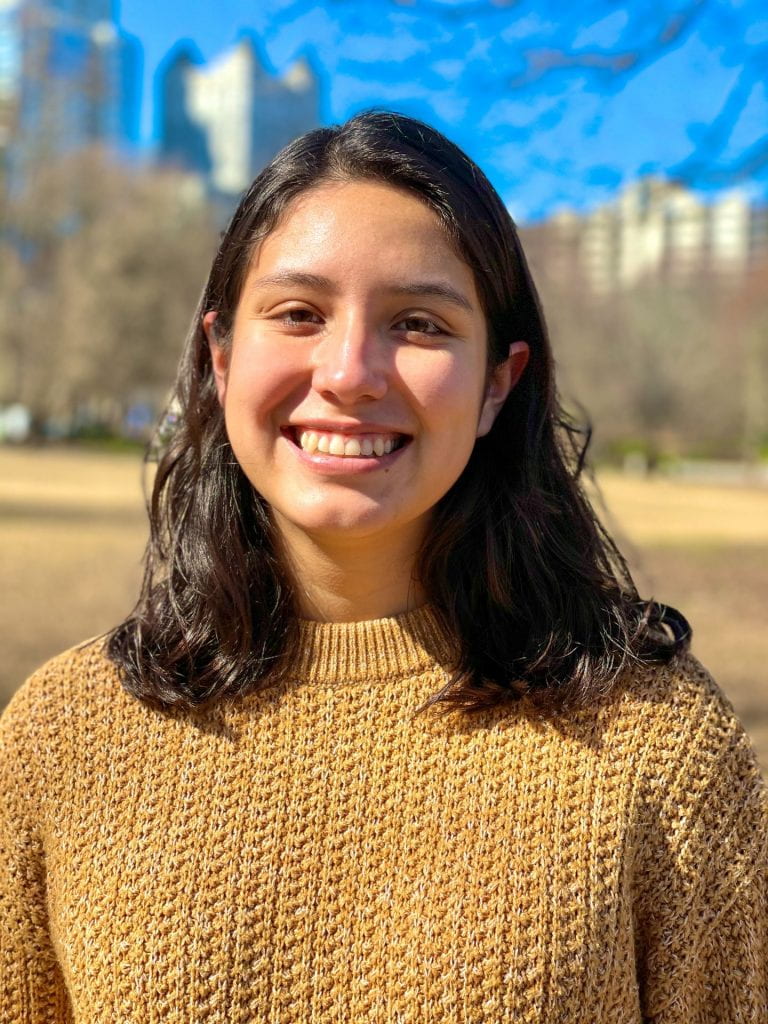
Finding Her Place Through Mentorship
Fernanda Moreno
Computational Media (GT ’21)
How has mentorship impacted your life?
Mentorship has had a very positive impact on my life. When I was in high school, I did the Girls Who Code Summer Immersion Program in 2016, and my teachers there were the first women in CS mentors that I’ve had. They helped me feel like I was capable of succeeding in a computing field, and one of my mentors in that program was actually a Computational Media student at Tech at the time. She taught me computer science skills, helped me feel confident in my abilities, and she ultimately inspired me to apply to Tech and pursue Computational Media. Because of the mentorship I received, I was inspired to mentor others as well through Georgia Tech organizations and programs like Stempower, Girls Who
Code club, and being a peer mentor for CS 1100, the freshman seminar for computing students.
What’s your measure of success?
I measure success through happiness. I feel like when you’re at Tech, it’s easy to feel like you need to set a lot of goals for yourself to work at these big tech companies, have a lot of internships and side projects, and measure success in that way. Throughout my years here, I’ve learned to prioritize much more than that.
To me, what matters most is that I’m not feeling overwhelmed and that I have free time to go on long walks throughout campus and in Atlanta, spend time with my friends and girlfriend, bake some yummy treats, and binge watch movies and shows on Netflix, Hulu, and Disney Plus. The way I see it, happiness is success, and I always try to find happiness in little things so that it’s easy to be a happy person in general.
What has been the biggest challenge you have faced so far in your academic career and how did you overcome it?
A big challenge I’ve faced has been getting over this fear that I’m not as good as the people around me, and on a related note, learning to stay on top of my school work while not stressing myself out too much. I turned this fear into inspiration. In my first year at Tech, I had an awful work ethic. I would get things done, but only at the very last minute, and the quality of my work would not be so great. As a result, I felt like I was not good enough to be at Georgia Tech. Throughout my first year and beyond, I’ve made some friends who had these great work ethics and study habits, and so whenever I hung out with them to do homework and work on projects, I became super productive.
Having friends who inspired me to do better helped me be better. I developed more confidence in my abilities by just focusing more on myself instead of comparing myself to others. I took time to learn more about myself and my interests, so I focused on building my skills in those interests in any opportunity I could. Joining clubs like Girls Who Code, where I had the opportunity to mentor and teach high school girls introductory computer science skills, also helped me become more confident in my own abilities and grow from there.
What advice would you give to a girl or young woman that might be facing similar challenges?
Don’t compare yourself to others and focus on your own journey. Figure out what your interests are, academic and career-wise as well as just personal. Find people in your classes to study with and help each other grow. Take a lot of breaks and know that it’s more than okay to not be productive all the time.

CS Major Earns Adobe Research Women-In-Tech Scholarship
As far back as she can remember in her academic journey, Prerna Ravi has faced gender bias.
“I had to work doubly hard to prove myself and prove to others that we young girls are second to none when it comes to applying logic, rationale, and computing skills in STEM related projects.”
Her determination and hard work are serving Ravi well. She’s a third-year computer science major at Georgia Tech and now, she is the recent recipient of a 2021 Adobe Research Women-in-Technology Scholarship.
“This scholarship gives me a splendid opportunity to represent women in technology and strive toward Adobe’s lofty goals of including gender diversity, while pursuing my research goals,” said Ravi.
As a 2021 Adobe Research Women-in-Technology Scholar, Ravi will receive $10,000 for educational expenses, a yearlong Adobe Creative Cloud subscription, and a chance to interview for an internship with Adobe.
“…this recognition…has instilled a greater sense of responsibility and confidence in me to pursue my ambition for leveraging technology in the field of education.”
“More than anything else, this recognition means a lot to me and it is indeed a life-changing moment since it has instilled a greater sense of responsibility and confidence in me to pursue my ambition for leveraging technology in the field of education,” said Ravi.
Ravi is the head teaching assistant (TA) for Introduction to Object-Oriented Programming (CS 1331). She’s taken on the role to “give back to the community” in appreciation for the mentorship that she has received from previous TAs.
Along with being a TA, Ravi is also an undergraduate researcher. Her interests include applying technology in the field of education, particularly within underrepresented contexts.
She is currently working with School of Interactive Computing (IC) Professor Thad Starner and the Georgia Tech’s Contextual Computing Lab to develop an American Sign Language recognition game. Once it’s complete, this game will help deaf children communicate with their hearing parents.
“I also recently conducted an ethnographic study with School of IC Assistant Professor Neha Kumar at the Technology and Design for Empowerment on the Margins (TanDEm) lab. I investigated the transition to online learning within the Indian education system under resource constrained environments during COVID-19,” said Ravi.
With this type of mentorship and support, Ravi says she’s been inspired and able to overcome academic challenges by relating them to real-world experiences.
“The teaching faculty has constantly encouraged me to go beyond my comfort zone and excel in various challenging situations. Georgia Tech is where I have developed my life skills and these will stay with me long after graduation,” said Ravi.
Juggling Diapers and Deadlines in OMSCS
Becoming a parent is an exciting new chapter in a person’s life that brings an overwhelming amount of change. Most people try to shed responsibility and adjust their schedules for their new bundle of joy.
For Yanjin Long though, pregnancy and maternity leave was the perfect time to begin her journey as an Online Masters in Computer Science (OMSCS) student at Georgia Tech.
After working at Ernst and Young in its advisory section for a couple of years, Long was recruited to work for one of her clients, LendingClub, as a risk analyst. Long soon found a great mentor in Ty Sbano, the former head of LendingClub’s security and engineering department. She expressed interest in learning more about his team’s work, and transitioned to a security engineering role.
This transition exposed Long to coding, Python, and software-related projects, something she did not have much experience with as a business major. While she recognized the need for improving her technical skills, she also realized her desire to earn a master’s degree.
Benefitting the World Through Computer Science
Destini Deinde-Smith
Computer Science (GT ’21)
What is something about your time so far at the College of Computing that you will carry with you after graduation?
From the College of Computing, I will carry on the spirit of learning and teaching. I’ve grown to appreciate how social learning can be, and that we are always in the position to learn more. At the same time, everyone has something to offer and to teach.
Being an undergraduate TA has been one of the most rewarding experiences I’ve had at Tech. Through teaching I found an amazing community and learned how to reevaluate my relationship with the classroom. My time at Tech has taught me to be more introspective. I’ve learned how to work harder and work smarter. And I’ve learned how to view the world through the lens of technology.
How has mentorship impacted your life?
Mentorship has impacted my life because mentors are people who expose you to new opportunities. I learned about computer science and software engineering through conversations with mentors. These conversations encouraged me to do my own research and picture myself in new situations. It’s really important to have people in your life that encourage you to take risks and expand your world.
What’s your measure of success?
Happiness. I measure success by how I feel. Am I proud of the work I’ve done? Am I excited to keep improving? Do I look forward to challenges? I feel the most successful when I genuinely enjoy my work. It’s a very nebulous measure, but it’s easy to tell when you’re passionate about something. Finding that stride, being productive with the same work you’re passionate about, that’s success!
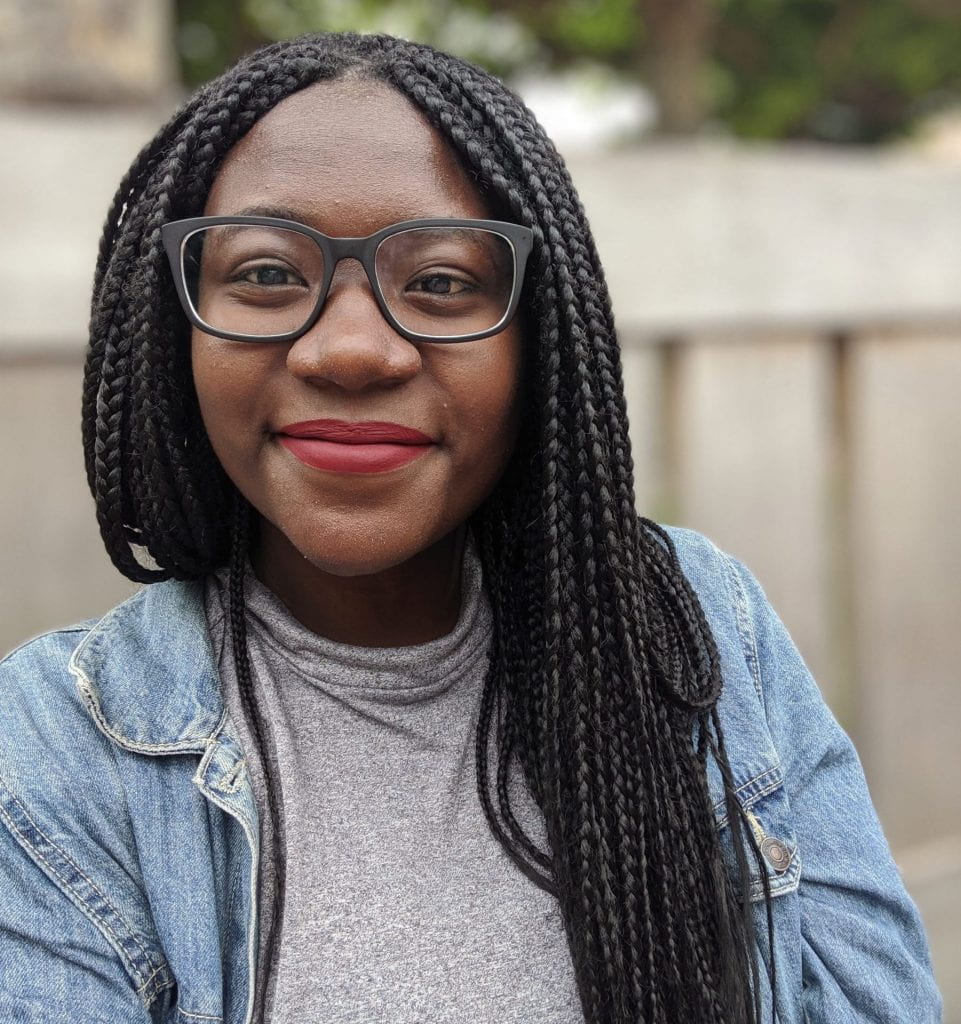
What’s the next big thing you’d like to accomplish at or beyond Georgia Tech?
The next big thing I’d like to accomplish at Tech is graduation! After four years of working very hard, I’m very excited to graduate. And in addition to completing my major coursework, I’ll also have completed two minors – Spanish and Science Fiction Studies. This is a big accomplishment for me because I made the time and found the resources to pursue all subjects that interested me. Beyond Georgia Tech, the next thing I’d like to accomplish is working as a software engineer. I don’t know that I’ll be a software engineer for my entire career, but I want to gain experience and learn how to use my degree to benefit the world. I also want to be a mentor to other people interested in computer science. Being a Black female software engineer is still way too rare. So, I hope to accomplish being visible and open in this role, so that more people will consider computing as an option available to them.


